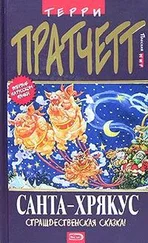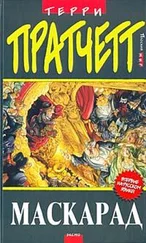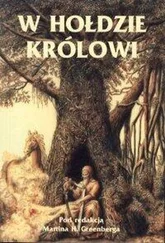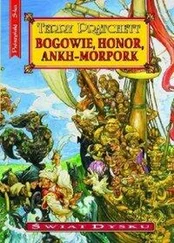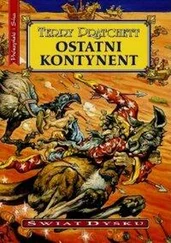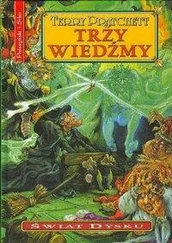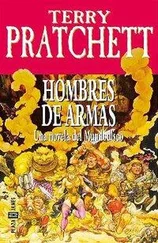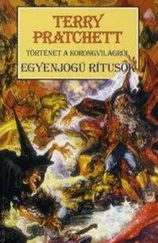The a-bit-like-singing went on. Perhaps it was some sort of ghost, then. The birds had made such a racket that any living person would surely have stopped and investigated.
His feet touched the tangle of flaking stone and tree roots that was the floor of the lower forest, and he moved silently between the dripping trees.
“Na, na, na” — clink! — “na, na, na” — clink!
That sounded like metal. Mau grasped his club in both hands.
— “give, for, wild, con-fu-sion, peace” — clink! — “Oh, hear, us, when, we, cry, to, Thee” — clink! — “for, those in per-ril on the sea!” — clang! — “drat!”
Mau peered around the buttress of a giant fig tree.
There was a lot to see.
Something had been wrecked, but it was not alive. It was some kind of giant canoe, stuck between the trunks of two trees and covered with debris that looked as though it would be worth investigating, but not now. A big hole in the side leaked stones. But all this was background. Much closer to Mau, and staring at him in horror, was a girl — probably. But she could be a ghost; she was very pale.
And a trouserman, too. The trousers were white and frilly, like the feathery legs of a grandfather bird, but she also had some kind of skirt tucked up around her waist. And her hair glowed in the sunlight. She had been crying.
She had also been trying to dig into the forest floor with some odd kind of flat-headed spear that had the glint of metal about it. That was stupid; it was all roots and rocks, and there was a very small heap of rocks next to her. There was something else, too, large and wrapped up. Perhaps I did walk in the footsteps of Locaha, Mau thought, because I know that there is a dead man in there. And the ghost girl, she was in my nightmares.
I am not alone.
The girl dropped the flat-headed spear and quickly held up something else, something that also shone like metal.
“I kn-know how to use this!” she shouted very loudly. “One step more and I will pull the trigger, I mean it!” The metal thing waved back and forth in her hands. “Don’t think I’m afraid! I’m not afraid! I could have killed you before! Just because I felt sorry for you doesn’t mean you can come down here! My father will be here soon!”
She sounded excited. Mau took the view that she wanted him to have the metal thing, because by the way she was holding it with both hands and waving it about she was obviously very frightened of it.
He reached out for it, she screamed and turned her head away, something went click, there was a small fountain of sparks from near one end of the metal thing, and, quite slowly, a little round ball rolled out of a hole in the other end and landed in the mud in front of the girl. There were… things on her feet, he noticed with a sort of horrified fascination; they were like black pods and had no toes.
The girl was watching him in round-eyed terror.
Mau gently took the thing away from her, and she flattened herself against the side of the canoe as if he were the ghost.
The metal stank of something bitter and foul, but that wasn’t the important thing. It had sparked. Mau knew what to do with a spark.
“Thank you for this gift of fire,” he said, and picked up his axe and ran for it before she could do anything dreadful to him.
In the wreckage on the beach Mau crouched over his work. The punk branch was only the start. He had combed the forest for dry twigs and bark. There was always some, even after heavy rain, and he’d carefully made little piles of everything from grass to quite thick twigs. He’d made a small heap of crumbled dried-up papervine bark and punk and now, with great care, he picked up the spark-maker.
If you pulled back the piece of metal at the top until it went click, and then pulled the piece of metal at the bottom, and made certain — at least the second time — to keep your fingers out of the way, then a sort of metal claw scraped a dark stone down some metal and sparks would be born.
He tried it again, holding the spark-maker just above the punk heap, and held his breath as a few sparks dropped onto fine dust, which went black where they fell.
Mau blew across the heap, which he shielded in his cupped hands, and a tiny wisp of smoke went up. He kept his breath steady, and a little flame crackled into life.
This was the hard part. He fed the flame with great care, teasing it along with grass and bark until it grew fat enough for its first twig. Every move was thoughtful, because fire is so easily scared away. It wasn’t until it was crackling and hissing and spitting that he tried the first thin branch. There was a nasty moment when the flames seemed to choke on it, and then they came up stronger and before long were asking for more. Well, there was no shortage of fuel. Broken trees were everywhere. He dragged them into the flames, and they burst as the heat boiled the water in them. Mau threw more wood on, piling it up so that sparks and steam soared into the dark. Shadows jumped and danced across the beach and, while the flames burned, there was a sort of life.
After a while he dug out a hole on the edge of the fire, buried the mad-root tubers just under the sand, and scraped glowing embers over them.
Then he lay back. When was the last time he had sat by a fire, here at home? The memory rushed in before he could stop it. It was his last meal as a boy, with all his family there, and in the Nation all his family meant, sooner or later, just about everyone. It was his last meal because the next time he ate on the island it would be as a man, no longer living in the boys’ hut but sleeping in the house of the unmarried men. He hadn’t eaten much, because he’d been too excited. He’d been too scared, too, because he could just about get the idea that this wasn’t only about him; it was also about his family. If he came back ready for a man’s tattoos and, obviously, the… thing with the knife where you must not scream, then it would be a triumph for them, too. It would mean that he had been brought up in the right way and had learned the Right Things.
The fire crackled and sent smoke and steam up into the darkness, and he saw his family in the firelight, watching him, smiling at him. He closed his eyes and tried to force the clamoring memories away, into the dark.
Had he sent any of them into the dark current when he’d walked in the steps of Locaha? Perhaps. But there was no memory there. He’d been curled up in the gray body of the Locaha-Mau, as a part of him trudged back and forth, doing what was needed, taking the dead to become dolphins so that they wouldn’t become food for the pigs. He should have sung a burial chant, but he’d never been taught the words, so instead he’d straightened limbs on the bodies as tidily as he could. Perhaps he had seen faces, but then that part of him had died. He tried to remember the face of his mother, but all he could see was dark water. He could hear her voice, though, singing the song about the god of Fire, and how the Papervine Woman got fed up with him chasing her daughters and bound his hands to his sides with great coils of vine; and Man’s younger sister used to laugh at that and chase him with coils of — But a wave passed over his mind, and he was glad it washed the bright memory away.
He could feel the hole inside, blacker and deeper than the dark current. Everything was missing. Nothing was where it should be. He was here on this lonely shore, and all he could think of was the silly questions that children ask… Why do things end? How do they start? Why do good people die? What do the gods do?
And this was hard, because one of the Right Things for a man was: Don’t ask silly questions.
And now the little blue hermit crab was out of its shell and scuttling across the sand, looking for a new shell, and there wasn’t one. Barren sand stretched away on every side, and all it could do was run….
Читать дальше

